
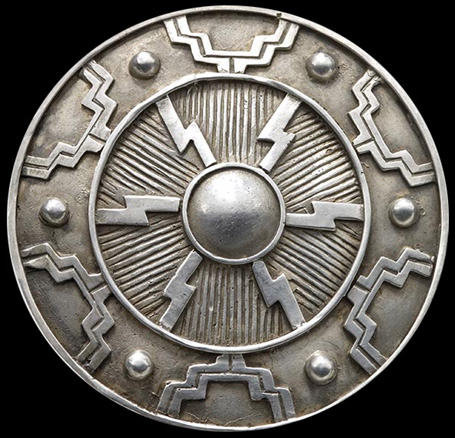
Interview with Knight's Cross winner SS-Hauptsturmführer Willi Hein, Battalion Commander of 5. SS-Panzer Division 'Wiking'. This remarkable soldier was even complimented by Adolf Hitler and also earned the German Cross in Gold, the coveted Honor Roll Clasp and the Panzer Badge in Silver with 75 engagements! He also earned the Golden Hitler Youth Badge with Oakleaves amongst many others. Heidelberg, 1988.
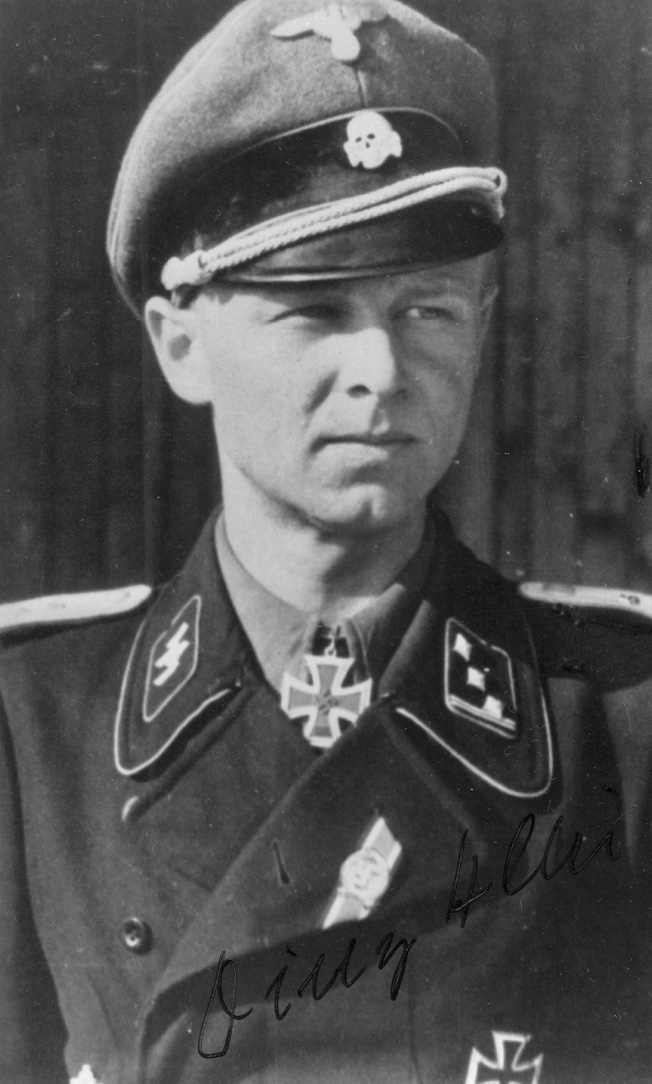

Thank you for agreeing to meet me. As I mentioned I would like to speak to
you about your time during the war and your thoughts. Can I start by asking
about your pre-war life and how you came to the SS?
Willi: Yes, I am not much into speaking about politics so I will tell you about
my service time. I was born in 1917 and was a typical youth. I was admitted
into the HJ [Hitler Youth] early on, as they were the only ones who seemed to have any fun.
We were able to play organized sports, do outdoors trips often and had a
good fellowship.
This service prepared me for later on in life, we had very good
leaders, and I eventually became one in my group. It is too bad today's youth
will never know the bond that the HJ had. It was for both boys and girls, each
having their own flags and groups. We learned a deep love for our people and the land we possessed.
At age 18 you had a choice to make, to either serve in the RAD [Reichsarbeitsdienst, or Reich Labour Service] and then go into schoolings for a career, or serve in the military. Hitler started
to rebuild the Wehrmacht in 1935, and there were ample choices to go into. I
had a wish to be a police officer, to serve and protect my people.
At the same time the SS-VT [SS-Verfügungstruppe, or SS Dispositional Troops, better translated as SS Combat Support Troops] was heavily recruiting, due to the war
starting in 1939 many of my friends went to join the SS, as they felt it was
most loyal to the Führer, and thus truer to Germany. We thought of the Wehrmacht
as still too based on the old aristocratic caste system.
The men who could not give up the old Kaiser idea eventually
turned on the Führer and were finally discovered in July 1944. So, you could
say many of us joined the SS-VT because we were led to the most loyal group
of men. I was a member of the NSDAP, something that is a liability today,
and must never be said. It was not always so in Germany, back then you were
going places if you were in the party.
I understand you were in the 'Wiking' Panzer Regiment, was Wiking made up
of non-German volunteers?
Willi: Yes, Wiking encompassed men from mainly Denmark, Norway,
Germany and some Swedes. These were some of the best men I have ever
met. Many north men fought in our ranks, and they fought like lions. No one in Wiking could ever be called a coward; we fought against tremendous odds
and stood fast.
I had many comrades that were close friends who never came home
to their loved ones. They now rest in foreign soil, forgotten, and hated, but it
was not like that 40 years ago, we were heroes. We formed a strong bond
that, for many of the survivors, still unites us today.
I understand you have met many of my comrades and it is nice to
see a young man take such a strong interest in our history. You seem to have
a very keen mind where you listen and absorb what is said, then make up
your mind. That's the way it should be, so many historians choose to believe
what another 'historian' tells them to.
Wiking was not a unique division; most SS divisions, especially later
in the war, had foreign members who volunteered. Some Germans were, you
might say, drafted against their will to the SS, and generally made poor
soldiers. This would have been Kriegsmarine and Luftwaffe men who no longer had
a role to play, and the SS needed men.
I had a man who was sent to us from the Luftwaffe, and we promptly
dismissed him as he was lazy and would have gotten us killed in the first
battle. The Waffen-SS was no place for lazy men or cowards, you always had
to be willing to risk your life for your comrade next to you.
We endured the worst the enemy had to offer, in both physical and
mental strengths. A friend of mine, our doctor, Tor Storm, was burned alive
by the Bolsheviks in Hungary after he surrendered with wounded soldiers.
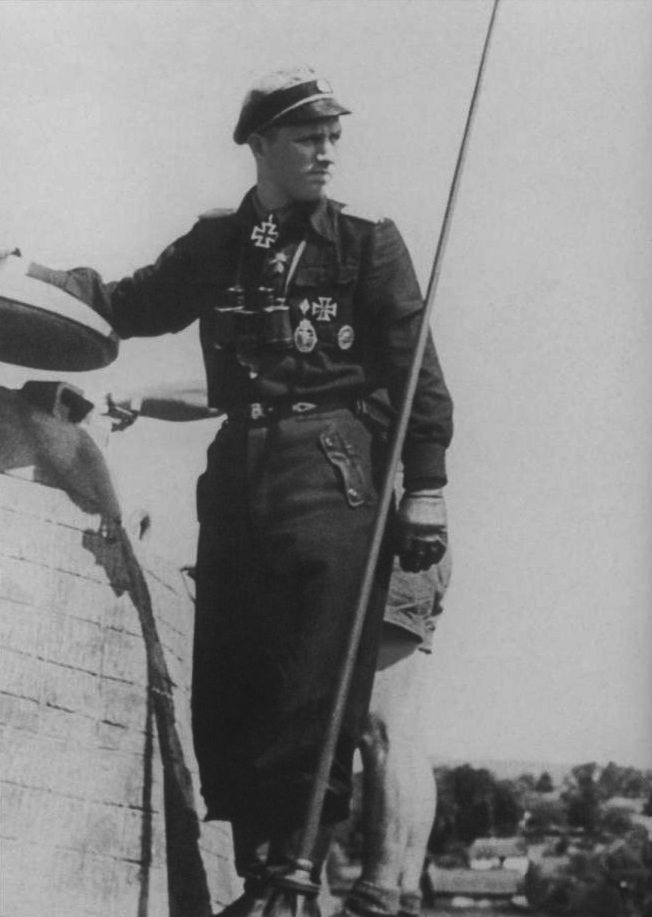
[Above: Willi Hein.]
What type of Panzer were you assigned to in Wiking?
Willi: By 1943 Wiking was reformed and the Panzer companies had the
Panther in numbers, which was a very capable platform. The Bolsheviks
feared this Panzer as the 75mm could take out all armor it faced. It is true it
had teething troubles early on, at Kursk, but these were quickly fixed, and by
1944 it was a dangerous weapon to the enemy.
The Panther had very good optics which made hitting the enemy
easier, the enemy many times did not have optics and had to aim through
their barrels. Our problem was they always had many more Panzers than we
did; it was not uncommon for a single Panzer to face 20 of the enemy.
We also had the Sturmgeschütz which had the long 75mm gun and
were very deadly to enemy armor. They were low and easy to hide, we could
fire and then get away if need be. If we would have only made the Stug and
Panther we might have won, as they were easy and quick to build.
Due to the nature of the Panzer war, we mainly lived in our Panzers.
They were where we kept our items for personal use. We would occasionally
get to take time off to rest in a nearby village, but mainly the Panzer was our
home.
You fought on the Eastern Front, what were the Russian people like, were
they friendly?
Willi: Oh yes, very much so. The ones who opposed us ran away with the
retreats. The only problems we had were with bandits hitting our rear supply
lines, like rails and bridges. Measures had to be taken to secure these of
course, mainly using Russian militias, or friendly allies. You would not know
it today, but when we entered into the country in June of 1941, the people
came out to cheer for us as we drove past. In Poland, and all over Russia and
Ukraine, we were seen as liberators for the people. They had been
oppressed by Stalin and welcomed our presence. One of the first acts I
remember seeing was the priests coming out of hiding and conducting
blessings on the people and our arms.
You would not know it today because the Soviet Union has told
the story that we rounded up and killed millions of their people, making them
slaves and forcing them to come to Germany to work. I believe they say we
killed 30 million, if I remember; this is absurd. If those number are anywhere
close to correct, then it means Stalin had them killed for supporting us during
the occupations.
I am sad to see some comrades applaud this number, saying it is
testimony to our arms and prowess on the battlefield. I know I saw countless
fallen soldiers, and sadly some civilians did get caught up in battles, or the
bandit attacks, but nowhere even close to their number.
I have heard after the war there were mass deportations and
executions for civilians and former POWs. If this true, I have a feeling that
much of this number is postwar deaths, but is still greatly inflated. I saw
nothing but friendliness from the civilians, and our men returned this in kind.
We shared food and medical care with them.
The Russians and Ukrainians that willingly came to Germany were
in work camps or stayed with German families. Others who broke laws were
punished with labor in the Reich, but this was not many. I saw one of these
camps and it housed less than 100.
I even saw the RAD being used to rebuild some farms and homes
that Stalin had destroyed in the retreats. Germany did not enslave the
Russians, in fact we tried to help them rebuild, and show them we meant them
no harm. We had a war to fight with Stalin, but not the people, unless they
fought us or broke laws.
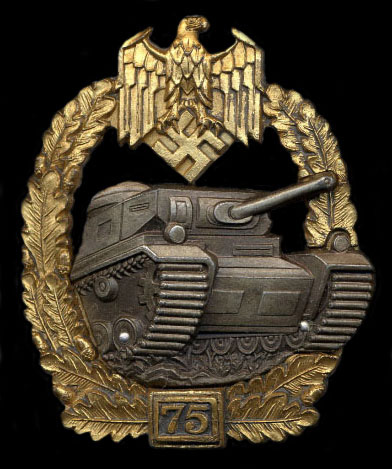
[Above: The amazing Panzer Badge in Silver with 75 engagements. This means to earn this badge you had to have been in 75 separate Panzer battles! This was a highly respected badge amongst the troops, and there was even a 100 version of this badge...]
Can I ask you how you came to be awarded the Knight's Cross?
Willi: Yes, I had already been decorated with the Iron Cross of both classes
and the German Cross in Gold, which was hard to achieve. In the winter of
1944 Wiking was defending the Cherkassy area, particularly Olschana.
We faced a much larger Bolshevik enemy, our data showed a 5 to 1
ratio in men, and more than 10 to 1 in Panzers. They launched mass attacks
along our front and flanks; I knew something had to be done. They were
coming at an area that was not well defended and held our supply reserves.
I was ordered to take some Stugs that had been freshly repaired,
crew them, and set off after the enemy. It was just bad luck two broke down
as the weather was wet and the ground was hard to move in. I pressed forward
with the attack with my single one.
We surprised the enemy, and opened up with all guns, I even used
my weapon to force the enemy to fall back. We ended up routing their attack
and forced them to retreat with heavy losses. I still see those poor bastards
running scared, one even shit his pants when I missed him and had to reload.
He turned and ran with brown running down his leg.
I wanted to laugh so hard, but I was in that enraged fighting mind so
I just let out a wild yell and shot at others who were now halting their advance
towards us. That day was a good day; one single gun routed a superior enemy
attack and caused them severe losses. They went the way I was hoping they
would go, into the open and this made them easy targets.
This action was me only doing what I was ordered to do, but it saved
our lines and broke the attack. I was surprised when my commander told me
I was put up for and approved for the Knight's Cross. I received many
congratulations from my friends and comrades.
You also fought in Hungary, what was it like?
Willi: It was not very pleasant, I will tell you. I was still with Wiking, and we
gave up Cherkassy, retreating and being pulled out to refit. By the end of the
war, the enemy had pushed us out of Poland and all of Ukraine. We had
orders to hold Budapest, which was a disaster for the Waffen-SS.
We came into Hungary during the winter and it was cold and hard
to move. We were understrength and very worn out. Yet we knew we could
not tire; this fight was too great. The oil fields had to be held as it was our
last area to get oil. We had synthetic plants, like the ones at Auschwitz
Birkenau, but they fell in January.
We defended Hungary to the last round and lost many good men
there. My comrade Hans Dorr [April 7, 1912 - March 21, 1945] was unlucky to be in a barn and a gun crew, who was missed in a search, fired a round at his staff, killing them. This was
a hard blow to not only me, but the division. I also lost a personal friend in
Kurt Schumacher [March 8, 1923 - March 20, 1945], a fellow Knight's Cross bearer; we both survived
Cherkassy and were given the award.
You could say the fighting in Hungary was our last gasp as an
organized force. Wiking was moved up into the Reich, and by then it was
over. Men started to be sent home to their families, others to see if their
families were even still living.
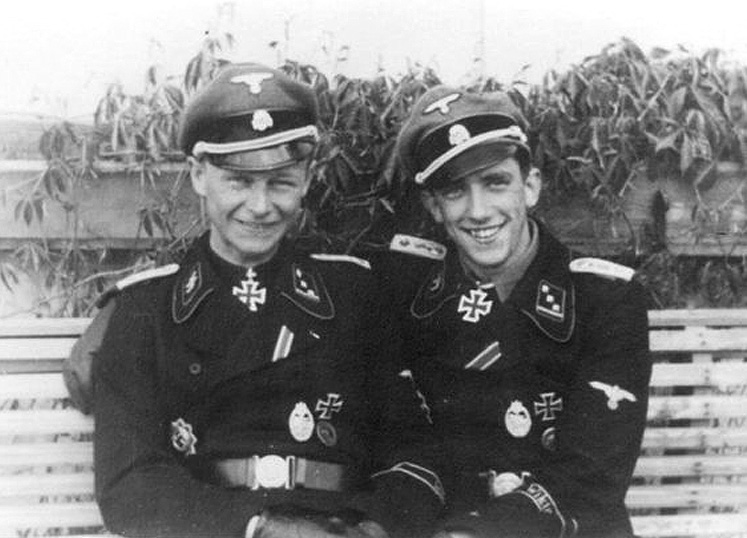
[Above: Willi Hein (left) next to him is his best friend, Kurt Schumacher, who was killed in action during the last few days of the war.]
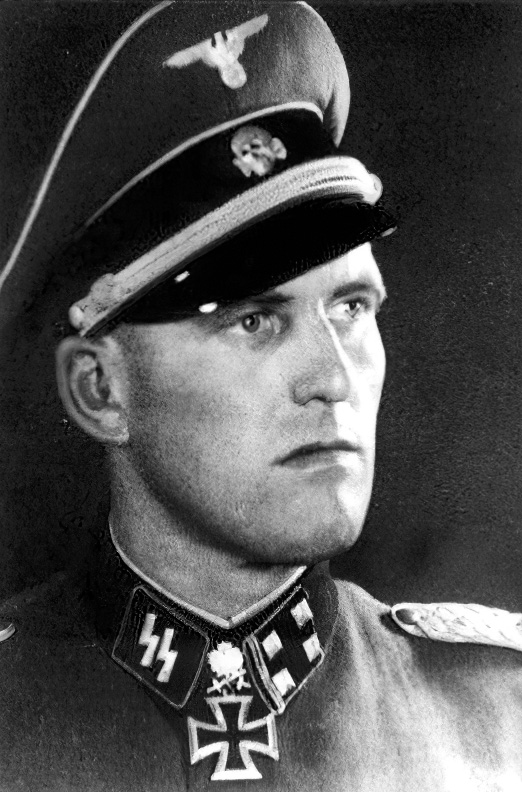
[Above: Hans Dorr, an incredible soldier. As you can see here he also won the Knight's Cross and the Oakleaves and Swords, a remarkable achievement. Dor also won a massive array of other medals and was wounded sixteen times during the war! I love his snarl seen here!]
Willi Hein's Knight's Cross recommendation:
'Following the union of the two Soviet Ukrainian Fronts in the area of Schpola-Swenigorodka, the enemy commenced a surprise attack supported by tanks on the 29.01.1944 against the supply units of the SS-Panzer-Division 'Wiking', located in the Olschana area. Their first attack along the road against the northern part of Olschana failed with the loss of 7 self-propelled guns principally due to the efforts of 4 Sturmgeschützen under the command of SS-Obersturmführer Hein. The enemy thus tried again on the 30.01.1944. With two battalions, supported by an anti-tank regiment, they attacked the not-yet secured southern part of Olschana in order to occupy the only supply road of the encircled divisions and cut-off the German elements defending the northern part of the town.
SS-Obersturmführer Hein received the order to take 3 Sturmgeschützen to the southern edge of the town and protect it until an infantry Kompanie could arrive and properly secure it. Meanwhile the enemy had reached the village edge and occupied the supply road along a broad front. Obersturmführer Hein, who had lost one StuG to mechanical damage and another to enemy gunfire along the way, made the independent decision to launch an immediate counterthrust with the other Sturmgeschütz despite the seemingly hopeless situation and the lack of infantry support. With high-explosives, machine gun fire and machine pistol fire from his hatch, he forced the Russian infantry spearheads into a panicked flight and pursued them. Utilizing the panic that had spread among the enemy, he drove them into the open plains. With no cover available there the Russians took heavy losses.
Despite strong anti-tank fire from a well camouflaged anti-tank gun position along a row of bushy terrain, Hein continued forward with his attack and prevented the emplacement of further enemy anti-tank guns through harassing fire. Skillfully using the terrain for cover, he managed to outflank the enemy Pakfront from the right and in doing so eliminated 2 light anti-tank guns (4.5 cm caliber), 4 medium anti-tank guns (7.62 cm caliber) and 1 light infantry gun. Hein then eliminated the scattered support troops/equipment of the anti-tank gun unit and destroyed a self-propelled gun in a further pursuit action.
As a result of this bold surprise thrust the Russians fled back to their field positions about 2 km to the south, while leaving behind uncounted quantities of infantry weapons.
Thus the decisive and extremely brave actions of SS-Obersturmführer Hein managed to prevent an enemy penetration into Olschana and the blocking of the only supply road. It was thereby possible to relocate the important supply units of the Division and the Bataillon 'Narva' during a later displacement from Olschana.'

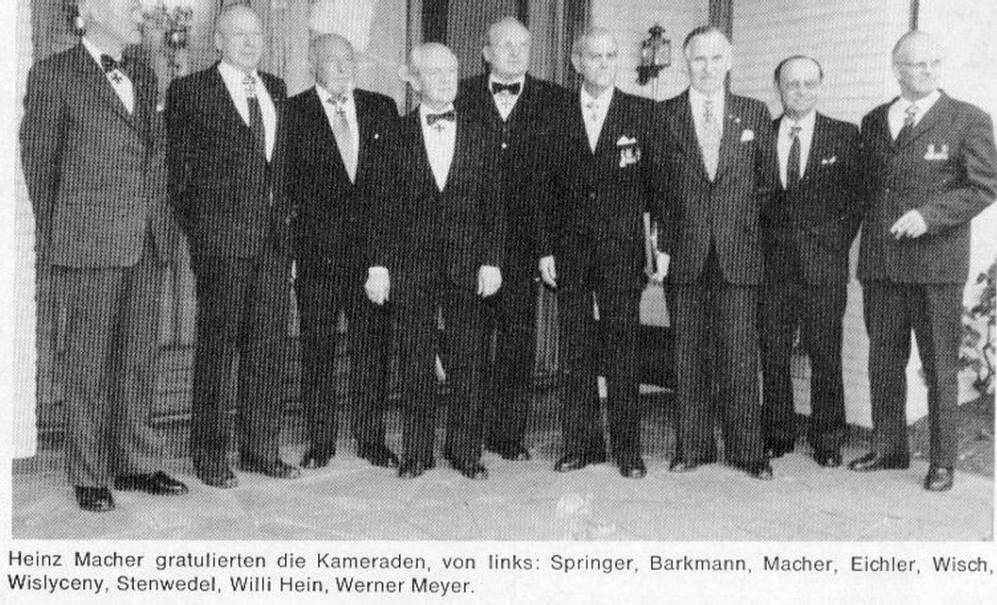
[Above: Old soldiers, all Knight's Cross winners. Our man, Willi Hein, second from right.]
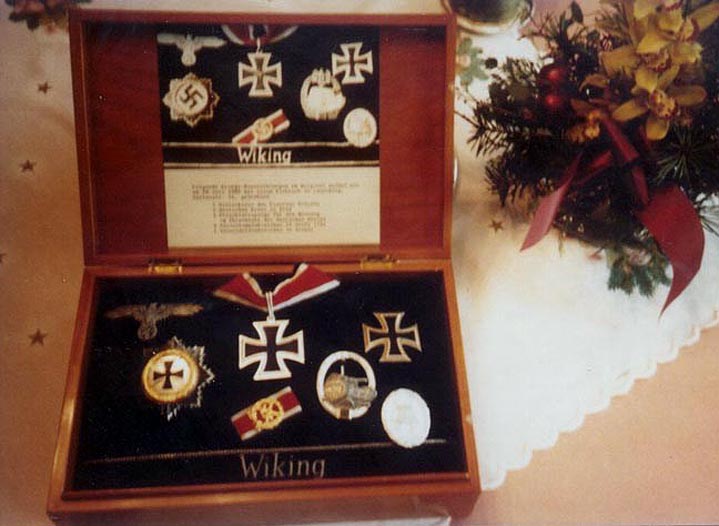
[Above: Hein's medals. Note that all of the swastikas on the medals have been removed by the occupiers. These 'de-nazified' medals were produced by the 'German' government after the war, since it was illegal to wear the ones with swastikas.]
Back to Interviews












